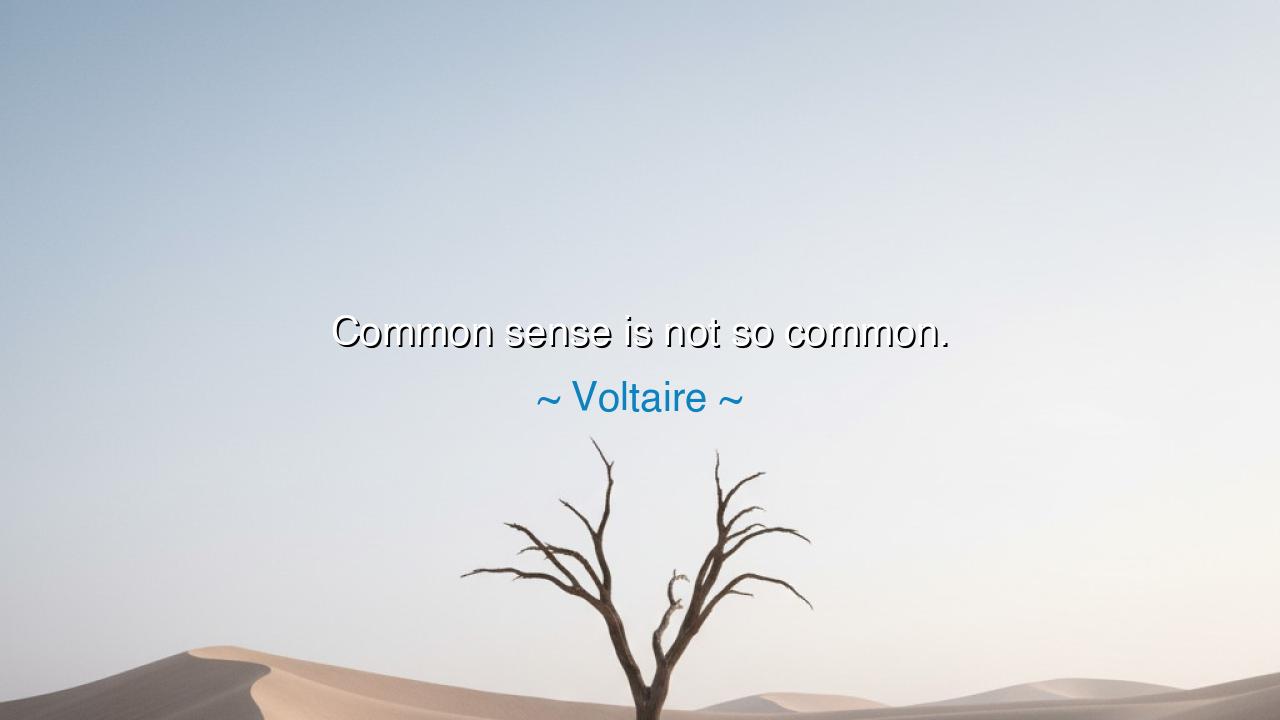
Common sense is not so common.






“Common sense is not so common.” — thus wrote Voltaire, the fiery spirit of the Enlightenment, whose wit cut through the follies of kings and the hypocrisies of men. In this brief yet piercing statement, he captures a truth that echoes through every age: that wisdom, though simple in principle, is rare in practice. What should be obvious is often ignored; what should be natural is too often forgotten. The quote is both lament and warning — a mirror held up to humanity, showing how far our reason can stray from reality, even as we believe ourselves enlightened.
The origin of this saying lies in Voltaire’s Dictionnaire Philosophique (1764), a work written not to flatter, but to awaken. In his age, reason had risen as a new god — science, philosophy, and political liberty were breaking the chains of superstition. Yet Voltaire saw that even amid this new dawn, mankind still stumbled in darkness. People spoke of reason and enlightenment, yet continued to act with cruelty, arrogance, and ignorance. Thus he wrote, half in jest and half in despair: “Common sense is not so common.” The phrase was his lament for a world that could build telescopes to see the stars, but could not see the neighbor in need.
To Voltaire, common sense meant not merely practical thinking, but the ability to see truth without distortion — to perceive the world as it is, guided by fairness, humility, and compassion. It is the wisdom of balance, the clarity that cuts through illusion. Yet, as he observed, the more men learn, the more they often forget this simple clarity. They replace it with pride, ideology, and ambition. The philosopher becomes blind to his own arrogance; the ruler becomes deaf to the cries of his people. Knowledge expands, but understanding shrinks — and so, even in an age of brilliance, common sense grows rare.
Consider the example of the French Revolution, which erupted not long after Voltaire’s death. It was born from the highest ideals — liberty, equality, fraternity — yet soon descended into blood and chaos. The same people who fought tyranny became tyrants themselves. They had intelligence, passion, and purpose — but lacked common sense, that humble wisdom that tempers justice with mercy and idealism with patience. In their blindness, they destroyed the very dream they had built. Voltaire’s warning had come to pass: when reason is not grounded in simplicity and humanity, it turns upon itself.
But the saying also speaks beyond politics — it is a truth of everyday life. How often do men and women, in their pride, ignore the plain wisdom before them? How many lives are troubled by greed, haste, and folly, when a moment of simple understanding could bring peace? The merchant who cheats his customer loses honor for a coin; the worker who shirks duty deceives himself more than his employer; the parent who does not listen to the child forgets the first lesson of love. These are not failures of intelligence — they are failures of common sense, which is born not from books, but from heart and experience.
Voltaire’s words remind us that the highest wisdom often hides in the simplest truths: do not lie, do not harm, think before you act, listen before you judge. Yet because these principles are easy to say and hard to live, they become rare. The wise man, therefore, must cultivate humility — for it is humility that gives birth to common sense. Only the one who admits he might be wrong can see clearly enough to be right. Only the one who listens deeply can truly understand.
So, my listener, take this as your charge: in a world that praises intellect, remember to cherish clarity. Do not confuse cleverness with wisdom. Let your mind be sharp, but let your heart remain plain. In every decision, ask not only, “Is it smart?” but also, “Is it right?” For in that small question lies the essence of common sense — the compass of all true reason.
For in the end, Voltaire’s lament is also a challenge: if common sense is not so common, then let it begin with you. Be the one who listens when others shout, who thinks when others rush, who acts with fairness when others crave advantage. In doing so, you become not merely intelligent, but wise — and in an age of confusion, that is the rarest brilliance of all.






AAdministratorAdministrator
Welcome, honored guests. Please leave a comment, we will respond soon